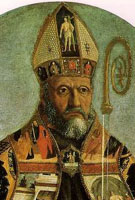Born to a pagan father and a devoutly Christian mother, the young Augustine demonstrated a formidable brain, rotten taste in friends and a liking for other people's pears. He attained prestigious academic positions in Carthage and Milan, while becoming increasingly dissatisfied with the ideas of the Manichean sect to which he belonged. Yet, although he was convinced of the superiority of Christianity, and ceaselessly nagged by his mother, he dragged his heels, famously praying 'Grant me chastity and continence -- but not yet'.
As he would later recount in his famous Confessions, his prayer was eventually granted in unexpected fashion and in time for Augustine to be reconciled with his mother before her death. Returning to Africa, he devoted the rest of his long life to the Church, becoming Bishop of Hippo and the most important theologian since St Paul.
Augustine certainly preached humility; one of his most important doctrines was the view that flawed human beings could never redeem themselves through their works, only through the grace of God. At the same time, he never seems to have doubted the importance of his own doctrines, while his speculations about the nature of Time suggest a certain impatience with God and his mysteries.
More than a hundred books, letters and sermons are credited to Augustine, and a remarkable number of these survive. They include many of the most important works of Christian theology, and not many pieces of satirical light verse. His best-known book, the Confessions, is an astonishingly beautiful and surprisingly frank work of spiritual autobiography.
In Augustine's last year, the city of Hippo was besieged by Vandals, a warlike tribe who offered plenty of potential for gruesome martyring. By this time, however, the great theologian was already on his deathbed, and eventually died of natural causes before the city could be sacked and burned. In deference to his memory, or possibly through oversight, the victorious Vandals would leave Augustine's cathedral and library intact.
Among the ideas that we owe to St Augustine are the doctrines of original sin, redemption through grace, and of the church as a heavenly city or kingdom. He is the patron saint of brewers, printers, theologians and sore eyes.














